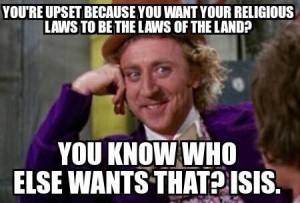“Under God’s authority”: The case of clerk Kim Davis
Not for winning or being appointed in clerk position, this will belong to her and, from that post, she can decide who deserves a service and who does not. The exercise of public service is not about choices (It’s Not About what you believe) because is a duty, and she can´t have that discriminatory behavior against any person in relation with the goods and services that the state provides to its citizens.
Public service is mandatory for all civil servant. Public administration and the civil service is characterized by the objectivity and impartiality that is embodied in the fact prevent personal or individual elements affect the civil servant criteria when making decisions.
Public and civil servants must be objective in the line of duty. It’s like saying “think with reason and not so much with the heart”. It’s like going to a restaurant and the customer orders to the waiter “I would like to order biscuits ’n’ gravy” and the waiter answers to the consumer “sorry I don’t like biscuits ’n’ gravy, so you don’t deserve it, too”.
Finally, rule of law is a principle in public administration and because of that she can´t deny the marriage service even more if the SCOTUS ruled the same sex marriage as a right nationwide. The public servants develops their duties inside a secular state.
arturodiazf


